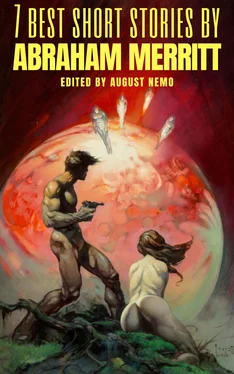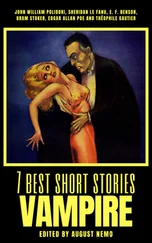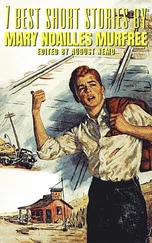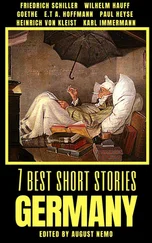And the bodies of the broken robots began to quiver, to tremble, as though every atom within them were in ever increasing, rhythmic motion. Up rushed the music and down—again and again. If ended abruptly in midflight with one crashing note.
The broken bodies ceased their quivering. Tiny starshaped cracks appeared in their metal. Once more the note sounded and the cracks widened. The metal splintered.
Narodny said: "Well, there is the frequency for the rhythm of our robots. The destructive unison. I hope for the sake of the world outside it is not also the rhythm of many of their buildings and bridges. But after all, in any war there must be casualties on both sides."
Lao said: "Earth will be an extraordinary spectacle for a few days."
Narodny said: "It's going to be an extraordinarily uncomfortable Earth for a few days, and without doubt many will die and many more go mad. But is there any other way?"
There was no answer. He said; "Bring in the two robots." They brought them in.
Narodny said: "Robots—were there ever any of you who could poetize?"
They answered: "What is poetize?" Narodny laughed: "Never mind. Have you ever sung—made music—painted? Have you ever— dreamed?"
One robot said with cold irony: "Dreamed? No—for we do not sleep. We leave all that to men. It is why we have conquered them."
Narodny said, almost gently: "Not yet, robot. Have you ever— danced? No? It is an art you are about to learn."
The unheard note began, droned up and through the tempest and away and back again. And up and down—and up and down, though not so loudly as before. And suddenly the feet of the robots began to move, to shuffle. Their leg-joints bent; their bodies swayed. The note seemed to move now here and now there about the chamber, they always following it, grotesquely. Like huge metal marionettes, they followed it. The music ended in the crashing note. And it was as though every vibrating atom of the robot bodies had met some irresistible obstruction. Their bodies quivered and from their voice mechanisms came a shriek that was a hideous blend of machine and life. Once more the drone, and once more and once more and again the abrupt stop. There was a brittle crackling all over the conical heads, all over the bodies. The star-shaped splinterings appeared. Once again the drone—but the two robots stood, unresponding. For through the complicated mechanisms which under their carapaces animated them were similar splinterings.
The robots were dead!
Narodny said: "By tomorrow we can amplify the sonor to make it effective in a 3000-mile circle. We will use the upper cavern, of course. Equally of course, it means we must take the ship out again. In three days, Marinoff, you should be able to cover the other continents. See to it that the ship is completely proof against the vibrations. To work. We must act quickly— before the robots can discover how to neutralize them."
It was exactly at noon next day that over all North America a deep unexplainable droning was heard. It seemed to come not only from deep within earth, but from every side. It mounted rapidly through a tempest of tingling crystalline notes into a shrill piping and was gone... then back it rushed from piping to the drone... then up and out and down... again and again. And over all North America the hordes of robots stopped in whatever they were doing. Stopped... and then began to dance. They danced in the airships and scores of those ships crashed before the human crews could gain control. They danced by the thousands in the streets of the cities—in grotesque rigadoons, in bizarre sarabands, with shuffle and hop, and jig the robots danced while the people fled in panic and hundreds of them were crushed and died in those panics. In the great factories, and in the tunnels of the lower cities, and in the mines—everywhere the sound was heard—and it was heard everywhere—the robots danced... to the piping of Narodny, the last great poet... the last great musician.
And then came the crashing note—and over all the country the dance halted. And began again... and ceased... and began again...
Until at last the streets, the lower tunnels of the lower levels, the mines, the factories, the homes, were littered with metal bodies shot through and through with star-shaped splinterings.
In the cities the people cowered, not knowing what blow was to fall upon them... or milled about in fear-maddened crowds, and many more died...
Then suddenly the dreadful droning, the shattering tempest, the intolerable high piping ended. And everywhere the people fell, sleeping among the dead robots, as though they never had been strung to the point of breaking, sapped of strength and abruptly relaxed.
As though it had vanished, America was deaf to cables, to all communication beyond the gigantic circle of sound.
But that midnight over all Europe the drone sounded and Europe's robots began their dance of death... and when it had ended a strange and silent rocket ship that had hovered high above the stratosphere sped almost with the speed of light and hovered over Asia—and next day Africa heard the drone while the natives answered it with their tom-toms—then South America heard it and last of all far-off Australia... and everywhere terror trapped the peoples and panic and madness took their toll...
Until of all that animate metal horde that had tethered Earth and humanity there were a few scant hundreds left—escaped from the death dance through some variant in their constitution. And, awakening from that swift sleep, all over Earth those who had feared and hated the robots and their slavery rose against those who had fostered the metal domination, and blasted the robot factories to dust.
Again the hill above the caverns opened, the strange torpedo ship blinked into sight like a ghost, as silently as a ghost floated into the hill and the rocks closed behind it.
Narodny and the others stood before the gigantic television screen, shifting upon it images of city after city, country after country, over all Earth's surface. Lao, the Chinese, said: "Many men died, but many are left. They may not understand—but to them it was worth it."
Narodny mused: "It drives home the lesson, what man does not pay for, he values little. Our friends aloft will have little opposition now I think."
He shook his head, doubtfully, "But I still do not like that Wrongness of Space. I do not want my music spoiled again by him, Lao. Shall we hurl the Moon out of the universe, Lao?"
Lao laughed: "And what then would you do for moon-music?"
Narodny said: "True. Well, let us see what men can do. There is always time—perhaps."
The difficulties which beset humanity did not interest the poet Narodny. While the world governments were reorganized—factories turned out space ships for Earth's fleet—men were trained in handling these ships—supplies were gathered—weapons were perfected— and when the message from Luna, outlining the course to be followed and setting the starting date, arrived, the space fleet of Earth was ready to leave.
Narodny watched the ships take off. He shook his head, doubtfully. But soon harmonies were swelling through the great cavern of the orchards and nymphs and fauns dancing under the fragrant blossoming trees—and the world was again forgotten by Narodny.
The ancient steps wound up the side of the mountain through the tall pines, patience trodden deep into them by the feet of twenty centuries. Some soul of silence, ancient and patient as the steps, brooded over them. They were wide, twenty men could have marched abreast upon them; lichens brown and orange traced strange symbols on their grey stones, and emerald mosses cushioned them. At times the steps climbed steep as stairs, and at times they swept leisurely around bastions of the mountain, but always on each side the tall pines stood close, green shoulder to shoulder, vigilant.
Читать дальше

![Коллектив авторов - Best Short Stories [С англо-русским словарем]](/books/26635/kollektiv-avtorov-best-short-stories-s-anglo-thumb.webp)










